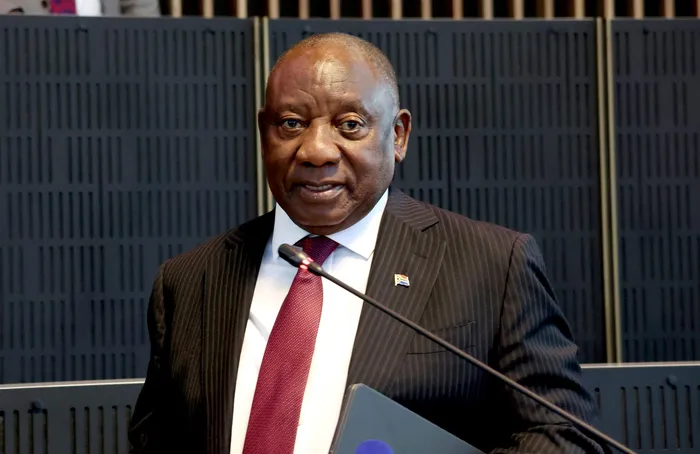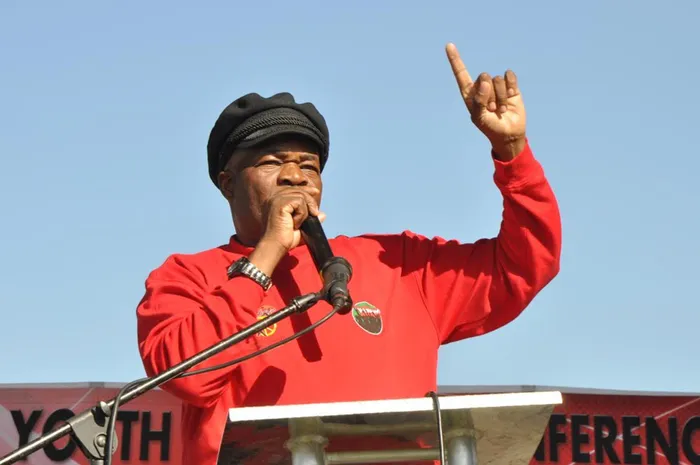Building a better future: the need for national dialogue in South Africa
COSATU

President Cyril Ramaphosa’s recent attendance at the Nampo Harvest Day. Judging by the volumes of fake news and hate speech and more importantly the painful levels of unemployment, poverty and inequality experienced by most South Africans, the President’s call must be supported and expedited.
Image: GCIS
President Cyril Ramaphosa made a call for National Dialogue in his address to Parliament shortly after the 2024 elections. Judging by the volumes of fake news and hate speech and more importantly the painful levels of unemployment, poverty and inequality experienced by most South Africans, the President’s call must be supported and expedited.
Despite our daunting challenges as a nation, we should not forget the massive strides we have accomplished since our hard-won democratic breakthrough in 1994. Not only we have repealed the numerous racist laws that did so much damage, but the state today spends more than 61% of the Budget invested in uplifting working-class communities.
Yet with 43.1% overall and 72% youth unemployment rates, and our status as the world’s most unequal society, we dare not rest.
The damage done by the decade of state capture and corruption are well known, and whilst we applaud the progress in uprooting this cancer and reintroducing a sense of transparency and accountability across the state, much more needs to be done to end this shameful chapter, in particular sending those politicians, officials and businesspersons who stole billions from the public to prison.
2025 has seen a flurry of fake news on social media aimed at not only undermining South Africa’s hard-won democracy and sovereignty but also our constitutionally sanctioned transformation journey.
Whilst some instances of racist incitement must be dealt with by law enforcement, others need to be tackled by the President’s call to a National Dialogue and more importantly by a concrete set of actions afterwards.
Judging by the vitriolic of much of our public discourse, we need to pay much greater attention to our entrenched socio-economic challenges fueling this deep sense of alienation across parts of society.
These must be anchored in government’s Budget and legislation but also by tangible commitments by the private sector and ordinary citizens.
Much has been said about the 49 South African migrants who departed for the US, we have far greater concerns to worry about, including the brain drain of skilled workers over the past few decades to far wealthier economies across the world.
We must ask collectively, as government, business, labour and society, what is to be done and what are our specific contributions to building that better life for all?
First, we must fix the state to capacitate public services, municipalities and State-Owned Enterprises to provide the services that working class communities and the economy depend upon. This includes expediting the infrastructure investment programme and providing relief for the poor.
This requires a bold and progressive Budget be tabled at Parliament that invests and does not starve the state of the resources it requires to fulfill its constitutional mandates.
The private sector too must play its part. This includes respecting our labour laws, embracing the principles of decent work and paying workers a living wage. Employees at any workplace are its most valuable asset, employers need to treat them as such. Undermining workers’ rights is a recipe for labour market instability and undermines productivity.
Employers need to hire South Africans first. We cannot sustain a society when four out of ten South Africans cannot find work, yet thousands of low skilled jobs are available and local youth are not prioritised. This trend across many sectors of the economy is extremely dangerous and has erupted into outbreaks of xenophobic violence in the recent past.
It is time that lip service to support locally produced goods, from clothes to food, from furniture to cars, is translated into concrete procurement by government, businesses and us as ordinary citizens. This is the most powerful way to support local businesses, create badly needed jobs and sustain economic growth.
Localisation must extend to our investment and pension funds. They need to prioritise investments in our mining, manufacturing and agricultural sectors amongst others. It is only when our companies shift their investments to South Africa, that we will be able to unlock the 3% economic growth needed to tackle unemployment.
Employers need to engage with unions in good faith and seek alternatives to retrenchments as required by the Labour Relations Act. We should not be adding to an already dangerously high unemployment rate.
This requires the Unemployment Insurance Fund’s Temporary Employee Relief Scheme to be fixed and other public and private financial support for struggling businesses to be accessible to give these companies and their employees a fighting chance.
The Public Employment Programmes as well as internships and artisanships across the private sector need to be drastically ramped up to provide a path towards employment for millions of young people. This includes providing capital, training and market access for aspirant entrepreneurs.
If we are genuinely committed to social cohesion, then workers need to be paid a living wage. Well paid workers are not only motivated but also able to buy the goods that the economy produces. If we are serious about social cohesion, then we need to reduce the obscene wage gap, still so prevalent across the private sector between the highest and lowest paid employees.
These amongst other interventions can provide the foundations for not only a growing but a more inclusive economy and a progressive developmental state. These will lay the foundations for a more equal and just society. Much of the responsibility for these rests with the state and also the private sector.
There are elements that we as ordinary citizens are responsible for as well. Government puts in place our legislative and governance frameworks, but we must help ensure their implementation. We should not be content to outsource the nurturing of the democracy that generations sacrificed so much to secure, to others to nurture and defend.
Similarly, we must not take for granted our vision of a non-racial, non-sexist society. Our actions must constantly speak to this call of the Freedom Charter. This requires all of us to spend more time listening to and addressing the concerns of society, in particular the most vulnerable.
Solly Phetoe is the Cosatu General Secretary.

Solly Phetoe.
Image: File
BUSINESS REPORT